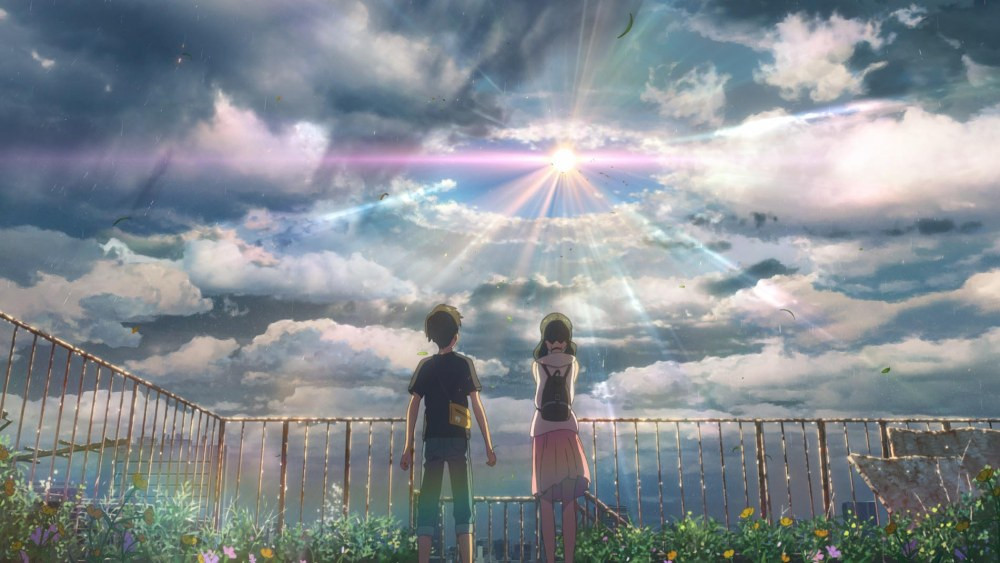Popular Reads
Top Results
Can't find what you're looking for?
View all search resultsPopular Reads
Top Results
Can't find what you're looking for?
View all search results‘Weathering with You’: Makoto Shinkai’s most urgent film
This article contains major spoilers. You’ve been warned.
Change text size
Gift Premium Articles
to Anyone
This article contains major spoilers.
The film starts with an image of rain. We could hear and see how hard it poured on the beautiful yet cloudy Tokyo. The camera tracks out and we realize the scene we just saw was a view of a window. Now, we see a reflection of our protagonist, Hina (Nana Mori) from the window of a hospital ward. She is witnessing her mom lying in bed, fighting to live. As she stares out of the window, she realizes that she saw a light in the middle of a cloudy day. It was not normal. All she wanted was to have a sunny day to cheer up her mom, so she decides to get out of the hospital and goes to the rooftop of an abandoned building where she finds a shrine and a spot that wasn’t touched by the rain. It is weird but peaceful. She prays for the sky to get clearer. It does.
Fast forward and we meet Hodoka (Kotora Daigo), a 16-year-old boy who enjoys the rain as if it was the greatest gift on Earth. We learn that this boy ran away from his home on an island to Tokyo. It is summer, but strangely, the rain never stops pouring.
Unlike Your Name, in which both of the main characters were separated until the third act of the film, director Makoto Shinkai decided that our two main protagonists in Weathering with You must meet in the first act of the film to portray how teenagers could survive in the vibrant life of Tokyo. Hina and Hodoka decide to make a weathering service. We learn that the rain never stops to the point when people could not even have wedding ceremonies, marathon competitions, or even firework festivals. Through this, we learn that people rely so much on the weather. We learn that through these sequences, humans are selfish individuals who think only of their needs and not of others. This is what Shinkai tried to portray.
Weathering with You might look like an adventure/coming of age/comedy film about two teenagers trying to survive in Tokyo by controlling the weather. But upon dissecting the movie carefully, a more profound argument lies within. It’s about how the world has changed and how we choose not to care. Shinkai still cleverly crafted Japanese spiritual values as a detrimental element in the film. While in Your Name he played with how the Japanese perceived time, in Weathering with You Shinkai portrays the mystery of sky, Earth and a maiden who connects them both to create a balance. A legend stated that the maiden who connects both the Earth and the sky should sacrifice herself. In other words, Hina’s ability to control the weather had ramifications we know nothing about until the last part of the film's second act.
That statement triggered a lot of questions. First, why Hina? The beginning of the film said it all. Hina was the only person who realized that there was a sunny day on a magical shrine. She was the only one who was willing to get out of a building, leaving her mother in the ICU to walk in the rain looking for the source of the light on an abandoned building and actually praying in the shrine. With that, Shinkai managed to portray our careless society. Our society often takes the weather for granted so we do not recognize a weather anomaly. In the film, praying at the sacred shrine earns you control over the weather and restores the balance. That person happened to be Hina.
But Hina had a bigger purpose than just clearing the sky at someone's request. As I said, there were ramifications. Her ultimate job was to restore balance. The weather would be back to normal if she sacrificed herself. That narrative lingered in my heart. Are we so careless toward Mother Nature that the only way we relate to her was by sacrificing a human being to restore the balance of nature?
And so the third act of the film explores that question. Would it be okay to sacrifice an innocent teenage girl who was just trying to survive in Tokyo for a clear sky? Or would it be OK to accept the fact that the rain would never stop pouring even though it’s summer?
Compared to Your Name, Weathering with You has a stronger sense of urgency. It may not be as romantic as Your Name, but Shinkai brought something else to the table: an extremely important topic to be discussed. It was presented so subtly that we may not realize what this film tried to argue in the first place. I watched it twice and when I understood the core of the film, I cried my heart out. It’s a cinematic wonder that people should not miss.
Since the film is going to be screened in the Toronto International Film Festival, Shinkai is to have a bigger exposure in Hollywood. Weather with You might be a serious contender for the 92nd Academy Awards. Especially knowing how Your Name was snubbed, members of the Academy might want to showcase more Japanese animated features to a wider audience every once in a while. (wng)
***
Reza Mardian is a film enthusiast and a big fan of Disney, Pixar and Studio Ghibli films, as well as all films in the running for an Oscar or Festival Film Indonesia award. He has a passion for writing about the politics of film festivals and the great movies that have touched his imagination. Catch him talking about movies on Instagram @mardian.reza.











